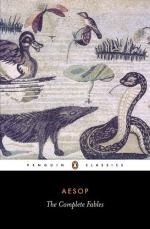A Man and a Lion were companions on a journey, and in the course of conversation they began to boast about their prowess, and each claimed to be superior to the other in strength and courage. They were still arguing with some heat when they came to a cross-road where there was a statue of a Man strangling a Lion. “There!” said the Man triumphantly, “look at that! Doesn’t that prove to you that we are stronger than you?” “Not so fast, my friend,” said the Lion: “that is only your view of the case. If we Lions could make statues, you may be sure that in most of them you would see the Man underneath.”
There are two sides to every question.
THE TORTOISE AND THE EAGLE
A Tortoise, discontented with his lowly life, and envious of the birds he saw disporting themselves in the air, begged an Eagle to teach him to fly. The Eagle protested that it was idle for him to try, as nature had not provided him with wings; but the Tortoise pressed him with entreaties and promises of treasure, insisting that it could only be a question of learning the craft of the air. So at length the Eagle consented to do the best he could for him, and picked him up in his talons. Soaring with him to a great height in the sky he then let him go, and the wretched Tortoise fell headlong and was dashed to pieces on a rock.
THE KID ON THE HOUSETOP
A Kid climbed up on to the roof of an outhouse, attracted by the grass and other things that grew in the thatch; and as he stood there browsing away, he caught sight of a Wolf passing below, and jeered at him because he couldn’t reach him. The Wolf only looked up and said, “I hear you, my young friend; but it is not you who mock me, but the roof on which you are standing.”
THE FOX WITHOUT A TAIL
A fox once fell into a trap, and after a struggle managed to get free, but with the loss of his brush. He was then so much ashamed of his appearance that he thought life was not worth living unless he could persuade the other Foxes to part with their tails also, and thus divert attention from his own loss. So he called a meeting of all the Foxes, and advised them to cut off their tails: “They’re ugly things anyhow,” he said, “and besides they’re heavy, and it’s tiresome to be always carrying them about with you.” But one of the other Foxes said, “My friend, if you hadn’t lost your own tail, you wouldn’t be so keen on getting us to cut off ours.”




